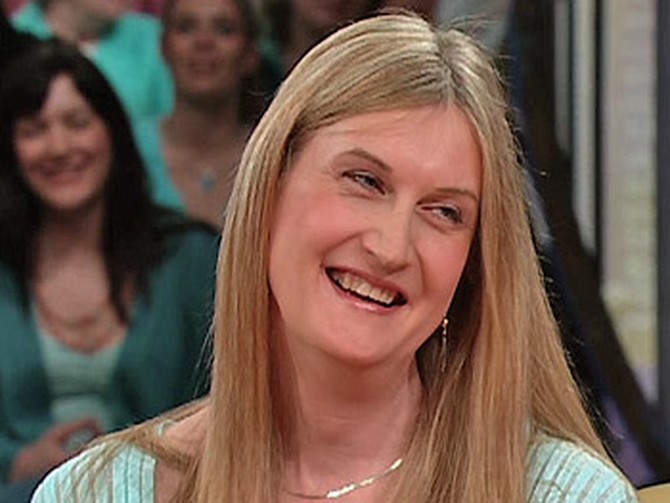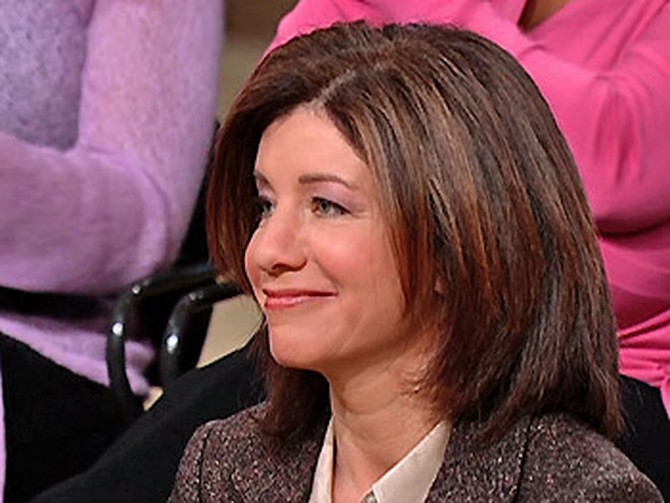State of the Union

When Jim Boylan was 6 years old, he knew he was different from other little boys because he often dreamed of being a girl. It was a crushing burden, and all along he hoped that love would cure him. During his teens, Jim tried to fit in. In college, he continued to keep up the front that he was a regular guy. He moved to New York and became a writer, but he was secretly dressing as a woman, hiding it from everyone who knew him as Jim. In graduate school, he continued the facade until he met a woman and fell in love.
They eventually got married, but his bride had no idea about Jim's secret life. He threw away all of his female materials: skirts, perfumes and makeup. They moved to Maine and started a family. After 10 years of marriage, Jim's thoughts of becoming a woman returned, and he realized that he could no longer ignore the feelings burning inside him.
Jim now faced the most difficult conversation of his life. After long, tearful discussions with his wife, Jim decided to become a woman. Female hormones altered his emotions and morphed his body. After a year, Jim completed the transition with full sex change surgery, and changed his name to Jenny.
When Jenny first told her story to Oprah and in her book, She's Not There, she called her wife "Grace." At the time, Jenny's wife did not appear on the show because she was still coming to terms with these events. Now Deedie, her real name, remains married to Jenny. And Deedie is ready to tell her side of this intriguing story.
They eventually got married, but his bride had no idea about Jim's secret life. He threw away all of his female materials: skirts, perfumes and makeup. They moved to Maine and started a family. After 10 years of marriage, Jim's thoughts of becoming a woman returned, and he realized that he could no longer ignore the feelings burning inside him.
Jim now faced the most difficult conversation of his life. After long, tearful discussions with his wife, Jim decided to become a woman. Female hormones altered his emotions and morphed his body. After a year, Jim completed the transition with full sex change surgery, and changed his name to Jenny.
When Jenny first told her story to Oprah and in her book, She's Not There, she called her wife "Grace." At the time, Jenny's wife did not appear on the show because she was still coming to terms with these events. Now Deedie, her real name, remains married to Jenny. And Deedie is ready to tell her side of this intriguing story.

Oprah: Can you take us to the day that Jim came to you and said I want to be a woman?
Deedie: I don't remember Jim ever actually saying the words, "I want to be a woman." There was a gradual process that I didn't really understand. There was a time when Jim wanted to cross-dress, to dress in women's clothes. I saw that as, like, role-playing. I used to be in theater. I thought, you know, whatever, you can do that, but it's not going to be part of our social life.
Oprah: When I read that in the book I thought, well, you are some kind of liberal wife.
Deedie: That may be true. Well, it wasn't just okay. I said…I didn't want to do it publicly. I didn't want it to have to do with our married life. I didn't want it to have to do with our sex life. I wasn't making out with a girl, you know. But as I said, I didn't understand it as an identity thing. I understood it as a role-play.
Jenny: I didn't really understand it either, in a way. I was still trying to see just how much of this I could express because, in a way, I didn't want to mess up my marriage either. But it's also true that if you're transsexual, you have this…neurological condition. And if you have it, you're born with it. And no amount of making a bargain with it is going to change that.
Deedie: I think I realized where this was going before Jim was even able to say this is what has to happen. Because we went through a process, because we talked to specialists and all of that, and I was reading the books about transgendered people, and I realized [what was going to happen].
Deedie: I don't remember Jim ever actually saying the words, "I want to be a woman." There was a gradual process that I didn't really understand. There was a time when Jim wanted to cross-dress, to dress in women's clothes. I saw that as, like, role-playing. I used to be in theater. I thought, you know, whatever, you can do that, but it's not going to be part of our social life.
Oprah: When I read that in the book I thought, well, you are some kind of liberal wife.
Deedie: That may be true. Well, it wasn't just okay. I said…I didn't want to do it publicly. I didn't want it to have to do with our married life. I didn't want it to have to do with our sex life. I wasn't making out with a girl, you know. But as I said, I didn't understand it as an identity thing. I understood it as a role-play.
Jenny: I didn't really understand it either, in a way. I was still trying to see just how much of this I could express because, in a way, I didn't want to mess up my marriage either. But it's also true that if you're transsexual, you have this…neurological condition. And if you have it, you're born with it. And no amount of making a bargain with it is going to change that.
Deedie: I think I realized where this was going before Jim was even able to say this is what has to happen. Because we went through a process, because we talked to specialists and all of that, and I was reading the books about transgendered people, and I realized [what was going to happen].

Deedie and Jenny will celebrate their 17th anniversary in June. Deedie says that she had previously thought about leaving their relationship because of the stress Jenny's transition caused her. In the end, however, she decided that it was more important to stay with the person she loves, despite spectacular changes. "Part of the reason we're still married is it is the same person," Deedie says. "And so the things that we shared didn't necessarily have anything to do with gender before."
A big part of Jenny and Deedie staying together is their love for their two children. "When I talk to the kids about it now, every once in a while they'll say, 'Yeah, it's kind of hard to not have a family like everybody else's,'" Deedie says. "But they still have the two people that love them the most in the world, the two most important people in their world. So, although I lost a husband, I still have a great partner, spouse and friend."
"The choice for me that is the best thing for me is to share this life that we've built together," Deedie adds. "If I didn't think it was the best thing for me, I would leave."
A big part of Jenny and Deedie staying together is their love for their two children. "When I talk to the kids about it now, every once in a while they'll say, 'Yeah, it's kind of hard to not have a family like everybody else's,'" Deedie says. "But they still have the two people that love them the most in the world, the two most important people in their world. So, although I lost a husband, I still have a great partner, spouse and friend."
"The choice for me that is the best thing for me is to share this life that we've built together," Deedie adds. "If I didn't think it was the best thing for me, I would leave."

Jenny and Deedie's two sons were 4 and 6 years old when Jim began his procedure. They're now 9 and 11. Jenny and Deedie say that, like many children, their sons are resilient in the face of great change. "I think that there are a lot worse things that can happen to a family," Jenny says. "Because, I mean, we are different. That's for sure. But in most of the ways that matter, we're not that different. We don't spend our time sitting around at home talking about gender change. We spend our time at home practicing the trumpet and making peanut butter sandwiches."
But one logistical challenge did present itself. "My older boy turned to me and said, 'You know, we can't be calling you daddy if you're a girl. That's just too weird,'" Jenny says. "And I said, 'Well, you can call me Jenny because that's my name now.' And he said, 'Well, Jenny sounds like the name of a little old lady.' So he said, 'Why don't we call you Maddy?' That's like half-mommy or half-daddy." So now Jenny's kids call her Maddy.
But one logistical challenge did present itself. "My older boy turned to me and said, 'You know, we can't be calling you daddy if you're a girl. That's just too weird,'" Jenny says. "And I said, 'Well, you can call me Jenny because that's my name now.' And he said, 'Well, Jenny sounds like the name of a little old lady.' So he said, 'Why don't we call you Maddy?' That's like half-mommy or half-daddy." So now Jenny's kids call her Maddy.

Jenny explains that she is getting comfortable with her new gender, but is she interested in the prospect of dating men?
"Somebody said to me, 'You know, Jenny, it's like you spent all this money on a new sports car. You're just going to leave it in the driveway?'" she jokes about her anatomy. "I am curious about men, but, to be honest, I'm not looking because I'm so grateful for what I have. This family's been through enough, I think. And Deedie has made room in her life for me. So I think it's my responsibility to do what I can to keep this family together. So I'm not looking."
Deedie says that her relationship with Jenny isn't really so complicated, though they did struggle to understand it early on. "There was a time when Jen really wanted to define our relationship and she said, 'So are we sisters?' And I said, 'Yeah, yeah, whatever. Sisters, whatever you like,'" Deedie says. "But more recently, more in our current life, I said really clearly, 'No, we're not sisters. We're married, but we're in a celibate marriage, but we're monogamous.' We're committed to each other. What we've lost is the physical intimacy, but we still rely on each other, we're still a team, we still have a family and a life that we share. That's how I think about it."
To that, Jenny adds, "And I think there are different kinds of love and there's passion. But there's also devotion. We may not have the passion, the intimacy that a lot of people have, but we certainly love each other more than a lot of couples I know that have more sex."
"Somebody said to me, 'You know, Jenny, it's like you spent all this money on a new sports car. You're just going to leave it in the driveway?'" she jokes about her anatomy. "I am curious about men, but, to be honest, I'm not looking because I'm so grateful for what I have. This family's been through enough, I think. And Deedie has made room in her life for me. So I think it's my responsibility to do what I can to keep this family together. So I'm not looking."
Deedie says that her relationship with Jenny isn't really so complicated, though they did struggle to understand it early on. "There was a time when Jen really wanted to define our relationship and she said, 'So are we sisters?' And I said, 'Yeah, yeah, whatever. Sisters, whatever you like,'" Deedie says. "But more recently, more in our current life, I said really clearly, 'No, we're not sisters. We're married, but we're in a celibate marriage, but we're monogamous.' We're committed to each other. What we've lost is the physical intimacy, but we still rely on each other, we're still a team, we still have a family and a life that we share. That's how I think about it."
To that, Jenny adds, "And I think there are different kinds of love and there's passion. But there's also devotion. We may not have the passion, the intimacy that a lot of people have, but we certainly love each other more than a lot of couples I know that have more sex."

Trina and Trevor have been married 10 years, and most of that time they've battled over the same thing—Trina's weight. Trina says that when she met Trevor, she was thin and her weight wasn't an issue. But after two pregnancies and 10 years of marriage, Trina had reached 225 pounds. She's since hired a personal trainer to help her "save her marriage." Trina says she and Trevor have separated twice, and both times he dated younger, thinner women. Trina says that Trevor's eyes still wander and from what our cameras caught while he was at the gym, she might be right.
"I think Trevor has an idea of the way that women should look and I've struggled for the last 10 years to fulfill that ideal, and I just can't," Trina says. "And I never feel as though I'm his ideal wife. He is a beautiful man. A good-looking man. And I just want to be his good-looking wife. But at the same time, I just don't want to give him everything that I think he wants all the time."
"I'm always proud of things she's done," Trevor says of Trina. "She's opened her own business. She has two wonderful daughters. But…I want the best for my wife. I want to see health and happiness."
Where does Trina and Trevor's marriage stand today? Get the update and Trevor's confession.
"I think Trevor has an idea of the way that women should look and I've struggled for the last 10 years to fulfill that ideal, and I just can't," Trina says. "And I never feel as though I'm his ideal wife. He is a beautiful man. A good-looking man. And I just want to be his good-looking wife. But at the same time, I just don't want to give him everything that I think he wants all the time."
"I'm always proud of things she's done," Trevor says of Trina. "She's opened her own business. She has two wonderful daughters. But…I want the best for my wife. I want to see health and happiness."
Where does Trina and Trevor's marriage stand today? Get the update and Trevor's confession.

Dr. Gail Saltz, author of Becoming Real, is a psychotherapist that deals with people with weight issues and thought that both Trina and Trevor have some issues to conquer.
"[Trevor,] you are very invested in your wife as a reflection of you, and for you it's all about the physical," Dr. Saltz says. "And until you either can see that differently, my question might be to your wife,' Why do you want to stay in this marriage?'"
Trina admits that she's always believed that Trevor was going to leave her and that she stays with him because she believes he's the best she can get. Dr. Saltz says that all Trina is doing is contributing to the problem—she's subconsciously setting herself up for him to leave—like a self-fulfilling prophesy.
"You're more than preparing him," Dr. Saltz says. "You're unconsciously driving him away. Like just get it over with. … And, you need to get to a point where you feel like, 'Boy, Trevor is one lucky guy to have me.'"
"[Trevor,] you are very invested in your wife as a reflection of you, and for you it's all about the physical," Dr. Saltz says. "And until you either can see that differently, my question might be to your wife,' Why do you want to stay in this marriage?'"
Trina admits that she's always believed that Trevor was going to leave her and that she stays with him because she believes he's the best she can get. Dr. Saltz says that all Trina is doing is contributing to the problem—she's subconsciously setting herself up for him to leave—like a self-fulfilling prophesy.
"You're more than preparing him," Dr. Saltz says. "You're unconsciously driving him away. Like just get it over with. … And, you need to get to a point where you feel like, 'Boy, Trevor is one lucky guy to have me.'"
Published 04/29/2005

